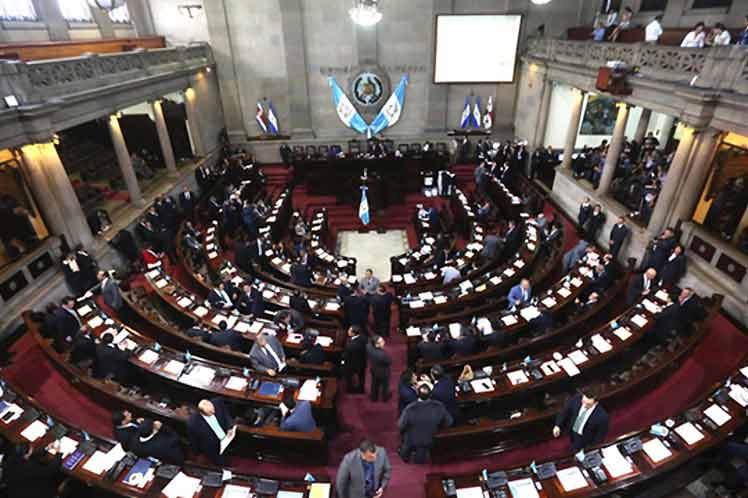Bills for economic revival and the election of Cortes would go to the background according to experts, who believe that Congress’ agenda will seek to provide resources to the government and promote initiatives that facilitate the purchase of pandemic vaccines.
While the Executive’s proposal to ensure the purchase of covid-19 vaccines already rests in Congress, some Members still doubt that authorizing more loans is the right path.
President Alejandro Giammattei’s proposal envisages issuing treasury bonds for Q800 million, plus other Q700 million unused resources for the pandemic in 2020 and thus ensuring Q1.5 billion for the purchase of vaccines.
“That worries me a little bit, because it’s obviously more debt; so we need to see this issue, even if there is an opportunity to take it from another part of the budget to transfer for the acquisition of vaccines, that may also be a necessary movement and not get too indebted to those treasury bonds,” Mr Rudy González of Vision with Values (Viva) said yesterday.
In the same line is the position of Ms. Ovelyn Morataya of the National Welfare (Well) party, who demands that the loans approved last year be first reported to Congress and what they were spent on, before thinking about more indebtedness.
Deputy Samuel Pérez of the Seed Movement also noted opacity in the terms of buying vaccines, and that issuing treasury bonds is very expensive financing for the state. However, the vote on the bench is not decided until further details of the Executive’s plan are known, he said.
“I can’t believe they want to finance it through debt. The second part that concerns is the opacity with which direct negotiation is thought. It has no guarantees of competition or other guarantees of transparency. It is also a government with a very questioned legitimacy to simply trust that they will do everything without having the suspicion that it will be a business for a company in the health sector,” Perez said.
Full agenda
Other issues of national interest also rest on Congress and several sectors expect them to be addressed, in addition to the adjustment of the budget to ensure the functioning of the state apparatus.
Vaccines and the budget eclipse the rest of the outstanding tasks, including some projects to seek economic revival, reforms to ordinary laws, and the late election of judges to the Supreme Court of Justice.
“At the outset they will start discussing the issue of the budget, but in the short term they will have to discuss partial changes to the budget that took effect in the previous year; it’s an issue that’s going to be both marking the Executive and Legislative agenda, and it’s necessarily going to be a priority,” said Francisco Quezada, researcher at the Center for National Economic Studies (One Hundred).
But only this issue, budgetary readequation, can cover the plenary sessions of several weeks, and although Congress has a majority in the official alliance, in the last sessions of 2020 they found it difficult to gather quorum, so agreements with the opposition will be needed, so as not to take risks.
“It will not only exhaust the agenda of the plenary, but the number of sessions, the number of talks… of all that the budget entails, because that’s where the engine of public administration really gets involved and there’s a very strong pulse of those who want to have resources and at all level. This will have a very, very strong lobbying. Last year’s lobbying was intense, but I think it’s going to be even more now,” Quezada emphasized.
Political scientist Geidy de Mata, director of the Institute of National Problems at the University of San Carlos de Guatemala (Ipnusac), recognizes that congressional interest is in the budget and purchase of vaccines, because the pandemic remains a matter of national interest; however, it is important to order state expenditures so as not to commit more resources.
“I think the fundamental thing right now is to rationalize spending, following the discussion that was generated at the time with the review that will have to be made of the budget (…) There are issues such as pandemics and vaccines, which are a priority for the health issue. Other governments have even prioritized investment for their vaccines; this is a health priority,” De Mata said.
Economy and justice
Although the priorities for the Congress seem to be clear, according to Juan Carlos Zapata, executive director of the Foundation for the Development of Guatemala (Fundesa), the Legislative has other important issues to follow up on them.
“There is a clear agenda that has been recommended from several international institutions for the country, both from the International Monetary Fund, Cacif, the G-13 and other social entities. It is important that they focus changes to outstanding laws since 2015, such as reform of the Electoral and Political Parties Act, as well as reform of the Civil Service Act and others on the economic agenda, such as the Anti-Corruption Act, the Road Infrastructure Act, the regulation of ILO Convention 175 and the insolvency law” Explained.
“The main agenda will focus, according to me, on the appointment of CSJ judges. Here we will see the pulse that they have with the purpose of trying to co-opt the Constitutional Court, that this is a clear agenda, a regressive legislative agenda, but it is what we believe will be pushed from Congress,” he said.
The Congress resumes the regular session on January 14, when they also receive the report of the first year of work by President Alejandro Giammattei. (https://www.prensalibre.com/guatemala/politica/nuevo-prestamo-para-compra-de-vacunas-no-tiene-consenso-en-el-congreso/)






































